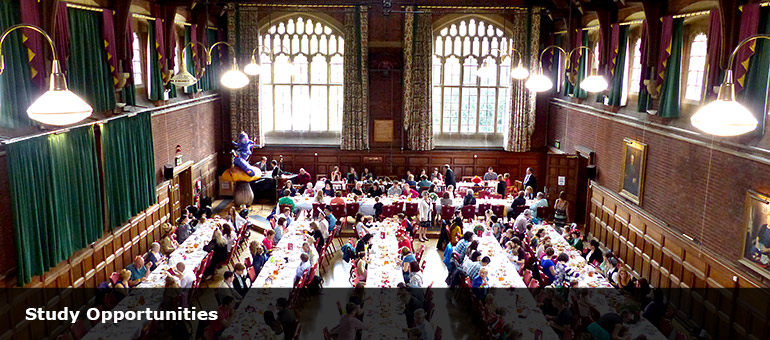
There are various opportunities to study children’s literature at Cambridge.
Within the BA
Children and Literature is a paper offered in Part II of the BA in Education . A large proportion of Education students in their final year choose this challenging but highly rewarding course.
Masters
Critical Approaches to Children’s Literature is a specialist Master’s course leading to an MPhil in Education (full-time) or MEd in Education (part-time). This unique course combines theoretical approaches to children’s literature with empirical research. It attracts students from a wide range of different backgrounds, all with a keen interest children’s literature. Some have returned, enriched and newly equipped, to their previous professions; others have gone on into children’s book or educational publishing, library studies, teacher training, and doctoral research.
Students on this course are eligible for the Jacqueline Wilson Award, awarded annually for an outstanding Masters thesis in children’s literature.
Visit the Faculty pages for more details on the course, or contact Professor Karen Coats [ksc38@cam.ac.uk].Culture and texts.
Doctoral
The Centre for Research in Children's Literature at Cambridge is home to a growing number of PhD students. Many have progressed through the MPhil in Critical Approaches to Children’s Literature, but the CRCLC welcomes applications from any prospective doctoral students with appropriate qualifications and research interests. Current PhD students have been successful in securing ESRC and AHRC scholarships; for more information about potential sources of funding, see the Cambridge Board of Graduate Studies.
The research centre provides a superb environment for PhD research: In addition to the wealth of resources provided by the Cambridge Libraries and top-class supervision, there is a highly active scholarly community and a stimulating programme of seminars. Regular group meetings with doctoral students and visiting scholars provide opportunities for sharing work, debating key and current issues in children’s literature – and celebrating successes.
Visit the Faculty Graduate Study pages for more details on the PhD and EdD Programmes or contact Professor Karen Coats [ksc38@cam.ac.uk].
Previous students say...
"When I first applied to be a visiting scholar at Homerton College, I had one purpose - research for a new young adult novel that focused on the era of Boudicca and the Romans in AD60-61. What unfolded from there was a wonderful three weeks that included a conference on picturebooks, at which I was able to present, many hours of reading and research on my topic in the Homerton Library, and many more hours of reading in both the Homerton and Education libraries, mostly reading picture books. I saw and heard of many UK picture books during the conference and soon realised how few of these make it all the way to Australia - usually only if they win an award of some kind. This makes it hard for an author like me to get a real sense of current publishing trends and ideas, as well as illustration styles and general developments. It was very useful to be able to read a wide range over a shortish period of time. The historical texts in the Homerton Library were an excellent resource and I have come home with a whole notebook of notes and ideas." Dr. Sherryl Clark (Visiting Scholar, September 2018)
"This course gave me the opportunity not only to get to know more books and authors, but also to share my love for literature with distinguished scholars." Lina Iordanaki (PhD)
"This is probably the most exciting time to be doing a PhD in Children's Literature at the University of Cambridge. You will be supervised by people whose names appear on the covers of most academic books you'll borrow from the library, and you will end up meeting many other experts now and then at conferences or when they come to visit. Because the discipline is still relatively young and the supervisors completely open to new ideas, you will be truly able to use your imagination, tackle big issues in current theories, and even formulate new ones. Regular meetings with other PhD students are organised, in which you will be encouraged to share your research and think creatively about the many outstanding questions in children's literature criticism." Clementine Beauvais (BA, Masters, PhD)
"The Masters programme was fascinating, challenging, and thoroughly enjoyable. I felt fully supported throughout and I was really proud of what I managed to achieve during the year." Emma Reay (Masters)
"I found the MPhil in Critical Approaches to Children's Literature to be a highly rewarding course, both academically and personally. Through the seminars, I learned a great deal about areas as diverse as cognitive poetics, animation and posthumanism, and greatly enjoyed the stimulating debates we had. I could tailor the three assignments to my own research interests (disability in children's literature), and my knowledge of literary theoretical frameworks and empirical research methods needed for these were developed well during our route and research methods sessions. I am excited to be back at the Faculty of Education starting my PhD in children's literature, and I am sure that I will continue to draw on the experiences of my Master's year throughout my doctoral study." Anna Purkiss (Masters)
"What I liked most about the modules was the variety of topics, periods, approaches, critics and texts we covered. Children's literature offers so many possibilities for research. It was great to receive such a broad overview of the field and also to venture into new 'territories', such as picturebooks and poetry, which I had not dealt with academically before. The Research Methods sessions were beneficial for me because we could exchange experiences and thoughts with people from other Education routes, and we could take from the sessions what would be useful for our own projects." Lisa Kazianka (Masters) You can visit her blog post with photos about her experience of the Masters course .
"From being introduced to a range of genres and sub-genres, themes, issues and methodologies specific to the field, to carrying out a large-scale project on fantasy literature (my chosen genre of expertise), the MPhil programme provided me with the best of everything. The seminars were thought-provoking, the assignments inventive, the resources extraordinarily unending, and the supervisions skillful and productive." Siddharth Pandey (Masters)
"I loved my time on my masters, and it's undeniably been useful in my job. I work in children's publishing, in publicity. I'm currently the Children's Publicist at Faber Books, having spent the last year and a half as Junior Press Officer at Walker Books. In that time I've attended literary festivals, managed campaigns, organised launches and run book tours. I've been the publicist for Shirley Hughes, Anthony Browne and Allan Ahlberg among others, and my job is different every day - as you can see from my photo! On top of that my masters qualification offers other opportunities; my background means I review children's books for three magazines and I also chair children's book events at literary festivals. I'm now moving on the next exciting step, but my previous manager has told me before that it was my masters that clinched me the first job." Hannah Love (Masters)
""Critical Approaches to Children's Literature" was a truly rewarding and challenging experience for me. Discussions in a surprisingly informal atmosphere at weekly sessions were always though-provoking and inspiring. The course provided me with wonderful background for my further career." Aliona Yarovaya (Masters)
"At "Critical Approaches to Children's Literature" you not only learn to work with children's fiction and picture books professionally, but also gain such crucial skills as working independently, managing your time effectively and, above all, being a responsible team player in the tight children's literature community." Helen Jameson (Masters)

